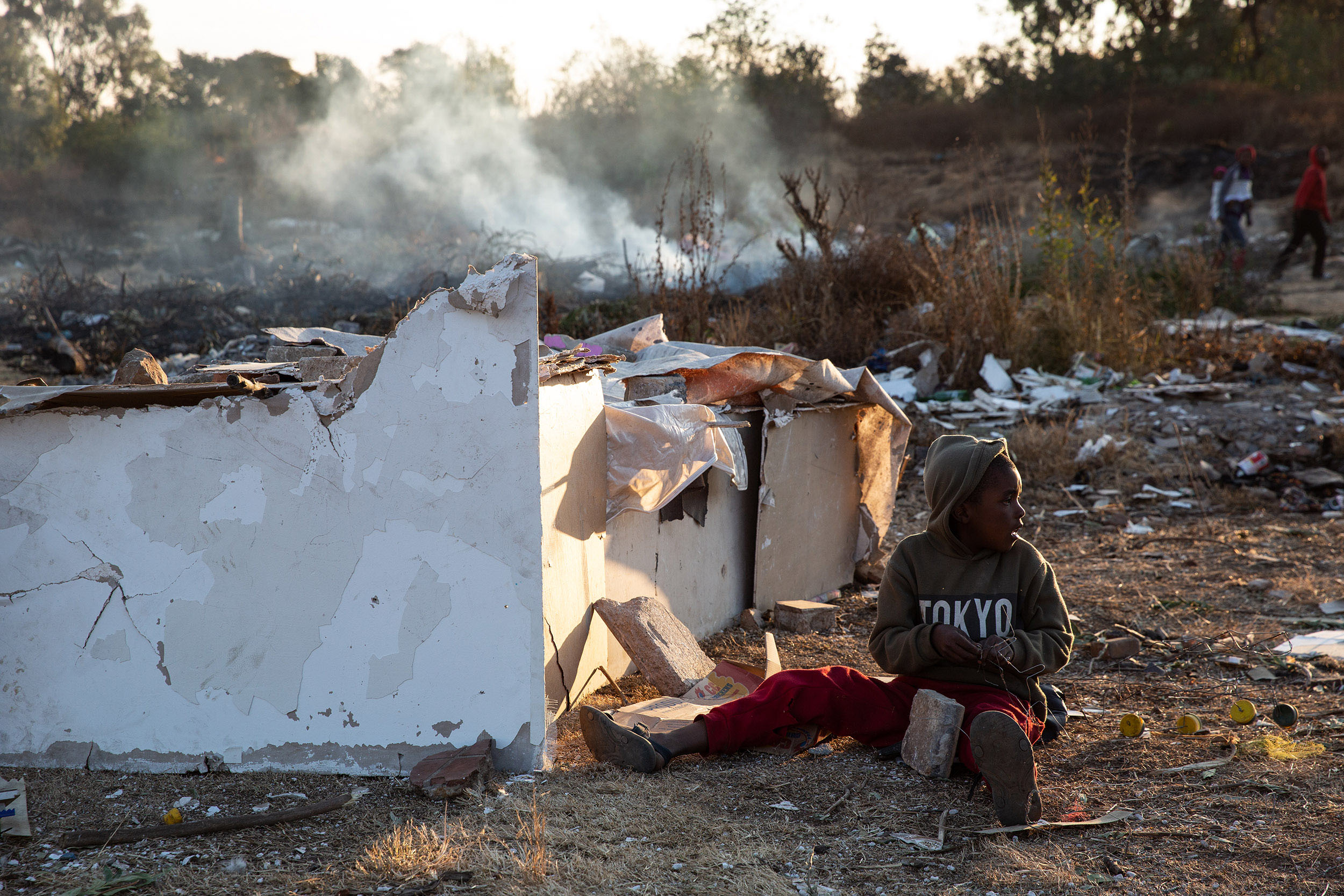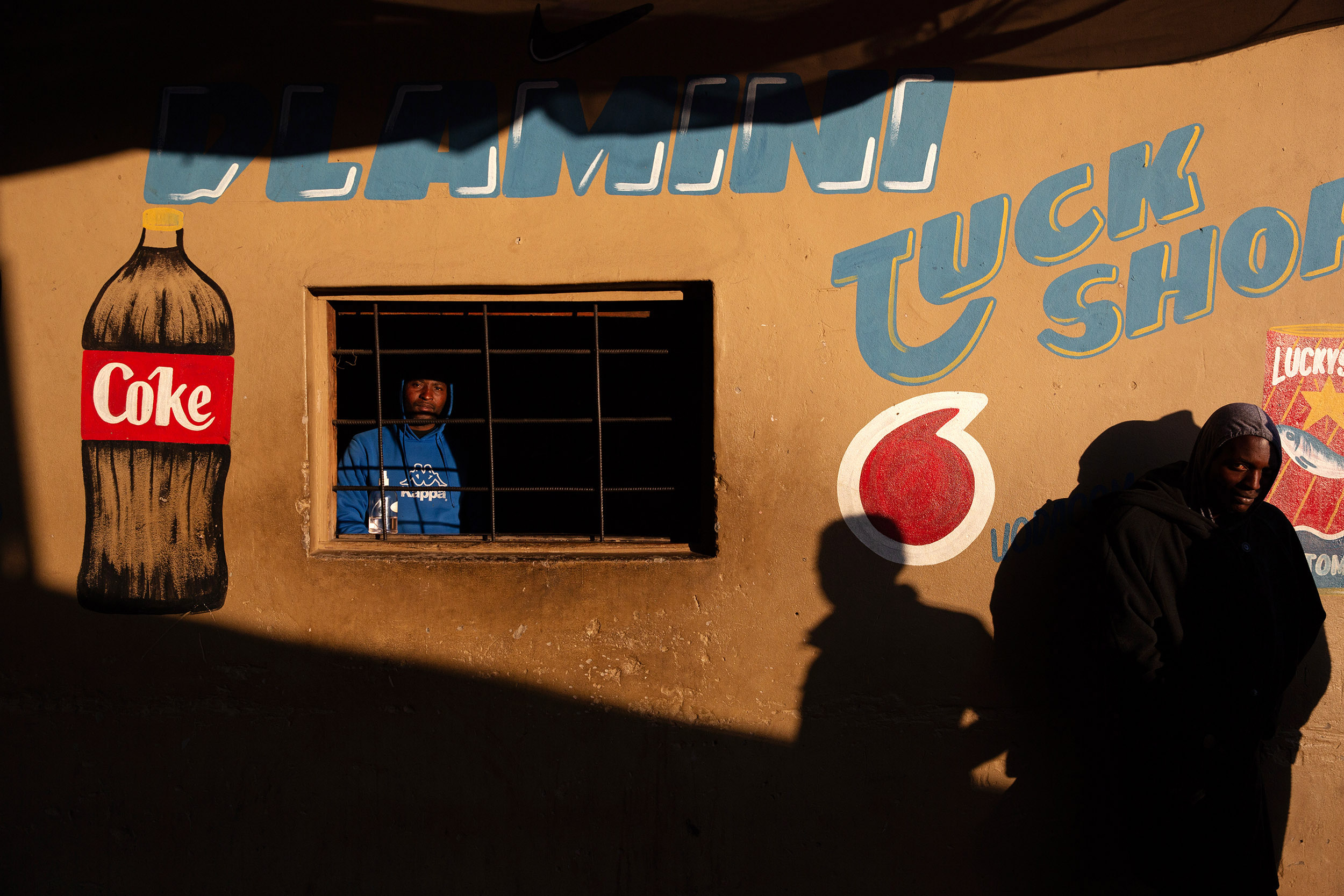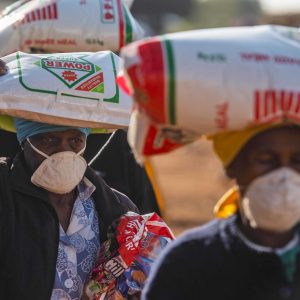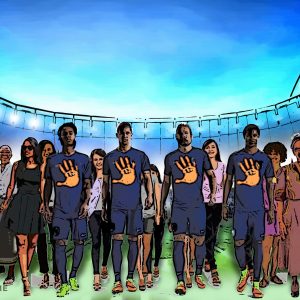Starvation will kill faster than the virus
In Ekurhuleni in the east of Gauteng, residents face hunger, unemployment, domestic violence and a lack of medical services – along with the threat of Covid-19 infection.
Author:
14 July 2020

In Tswelopele Ext 8 in Tembisa, Ekurhuleni, a woman stops abruptly, sending up a cloud of brown dust. “Hi,” she says to me, “I see you are carrying a pen and paper. Where do we register for food parcels?” When she realises her mistake, she asks, “Do you know where we can get food? I have children to feed.”
In Makause, also in Ekurhuleni, community activist General Alfred Moyo says, “What will kill people in informal settlements besides the virus is … starvation [and a] lack of medical attention.”
Moyo says hungry residents should not have to deal with the bureaucracy around obtaining food from non-governmental organisations. “If people put their names down for food, they are expecting that there is a food parcel that they will get this evening because they don’t have anything to eat this evening. They don’t want to hear long stories.”
Related article:
Life in Makause did not change drastically during the most stringent stages of the Covid-19 lockdown. The sprawling community continued to operate almost as usual.
Now, as the lockdown restrictions have eased, groups of men sitting on crates in front of tuck shops and stalls are scattered along the main road. In one section, a maskless man hobbles past another group of men playing dice and asks a community leader about food. “Please, my brother, don’t forget me. I am disabled,” he says, waving his crutch.
No government assistance
In March, a team of about 120 women and young people, including Moyo, educated themselves about the virus and began an awareness campaign, sharing as much information as they could with the 20 000 residents of the congested settlement. They distributed educational flyers, collected donations and supported families with food parcels and toiletries.

The announcement of the level five lockdown derailed the group’s plans for mass meetings and flyer distribution. But they changed their strategy and started using WhatsApp, SMS and a Facebook community group. By the end of March, they had distributed about 300 food parcels to elderly, disabled and sick people as well as child-headed homes and single mothers.
Three months later, they say they have not had assistance from any authorities, although water tanks have been delivered.
“Most officials … only know Makause when it’s election time,” says Moyo. “If there was no corona, next year we are going to local government elections, everybody would be bringing food parcels for elections, but people who are needing and begging for those food parcels [now] … they are not responding to them.”
Related article:
In April, over 500 people without masks stood in queues, eager to collect Community Policing Forum food parcels. The crowd was dispersed with rubber bullets and tear gas.
“People are hungry in Makause. When they heard that they are giving out food parcels and there is no registration, they flocked there, and it caused a stampede.
“People no longer cared about sanitisers, toilet paper or water and soap, they were now worried about stomach and food … nothing else, so the JoJo tanks were not even something they saw as … positive. They just wanted food,” says Moyo.
While some went home with food parcels that day, others stumbled back home empty handed, choking on tear gas.

Domestic abuse
“We are now in level three but there has never been compliance … like wearing a mask [or] maintaining social distancing,” Moyo says. “We also have the challenge of [government] bringing back alcohol and people going to church and that will be problematic. … Escalating gender-based violence is adding fuel to the issue.”
Three weeks ago, a woman opened a case of domestic violence against her 28-year-old partner who would not give her money for transport. He threw a portable stove at her.
Related article:
In August 2018, the Commission for Gender Equality (CGE) launched an inquiry into the high levels of abuse and mistreatment of women in the township after it observed women often withdrew cases of rape and domestic violence.
In Steve Kau Village in another part of Ekurhuleni, Neo Vilane, 39, hopes her husband keeps his job as retrenchments become a reality.
Vilane is unemployed and has two teenage sons.
Over the long lockdown months, she has been afraid to upset her husband who, she says, no longer physically or verbally abuses her but is prone to angry outbursts. He has stopped drinking and smoking, much to her relief.

“My focus is on the children now, and he sees that, so he has not been picking fights. My oldest grabbed a knife and told him he would stab him if he ever tried to hit me again, and since then he has just been silent in the house,” says Vilane, who is thankful that there is less tension now that her husband is back at work.
“Sometimes [my husband] will want to finish the bread, and I want him to understand that we must put the children’s stomachs first, and only eat after they have eaten,” she says.
Food shortages
Food is increasingly scarce, especially as informal food systems that feed millions begin to fall away. In April, food relief and support efforts by the African Reclaimers Organisation were derailed when the City of Ekurhuleni centralised its food relief system.
This disrupted food distribution for waste pickers in Makause, who were left hungry. A large number of people in the sector are migrants, who are mostly excluded from relief measures.

According to Stats SA, around three million people work in South Africa’s informal sector. This includes unprotected and unregistered workers with no written contracts, zero-hour workers and casual labourers. Car guards, street vendors and waste pickers have no safety net and do not receive basic benefits or much support from the government. Some have returned to work as regulations have relaxed.
“These are frontline workers and where they live is where the virus will spread. They work as security guards, domestic workers, hospital cleaning staff, cash till operators and gardeners who, due to constant mingling of classes in our society, will end up contracting the virus from their bosses,” says Moyo.
Street traders
Many in the area survive through artisanal mining, playing dice and cards, recycling and selling food at roadside stalls. Since the easing of the lockdown restrictions, street traders have been able to work provided they take the necessary precautions. Although foot traffic is low, some are making ends meet.
In Makause, street traders working near a local clinic were moved inside the shack settlement to operate from there. The jumble sales and second-hand clothes that used to litter the grass on the main road are no longer there.
Related article:
“It’s scary but we have no other way of making money apart from this,” says a man who does not want to be named. He sells chicken feet in one of the snake-thin passages in Makause under what he thinks is a valid permit he applied for on 9 April. He sprinkles seasoning on the chicken feet before placing them on an open fire. He constantly tells his customers to maintain a safe distance from him and each other.
Moyo says many in Makause were given forms to fill in and duped into believing the forms were permits. In some instances in Tembisa and Tshwane, trading permits were found to be invalid or illegally sold for around R300. Street traders in Western Cape’s Khayelitsha took to the streets during level four lockdown to protest against electronic permits, which excluded them.

Moyo said people are being turned back from hospitals and not being helped, including pregnant women about to deliver.
“There are no measures put in place to make sure those people have mobile clinics or paramedics … We cannot address that because we don’t have medical practitioners on our team,” he says.
Mashele Josias died in her shack after being turned away both from a local clinic and hospital without medication. A Mozambican migrant who barely earned a minimum wage working at a creche, she was diagnosed with malaria in December before returning to South Africa in January.
A lonely funeral took place for her on 16 April. Moyo suspects she was ill-treated and discriminated against because of her nationality and poverty.




